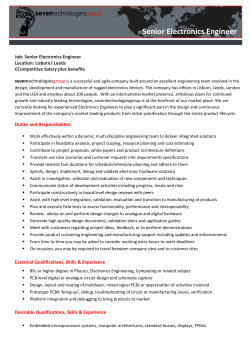
Electrical and Electronics Engineering Department
NATIONAL INSTITUTE OF TECHNOLOGY MEGHALAYA ____________________________________________________________________ __ ELECTRICAL AND ELECTRONICS ENGINEERING DEPARTMENT Syllabus for Written Test to Ph. D Programme, August 2015. Group A: (30 Marks: MCQ) Mathematics and General Aptitude 1) Calculus: Functions of single variable, Limit, continuity and differentiability, Mean value theorems, Evaluation of definite and improper integrals, Partial derivatives, Total derivative, Maxima and minima, Gradient, Divergence and Curl, Vector identities, Directional derivatives, Line, Surface and Volume integrals, Stokes, Gauss and Green’s theorems. 2) Discrete Mathematics: Basic operations on sets, cartesian products, disjoint union (sum), andpower sets. Different types of relations, their compositions and inverses. Different types of functions, their compositions and inverses. Complete partial ordering, chain, lattice. complete, distributive, modular, andcomplemented lattices. Boolean and pseudo boolean lattices.Algebraic structures with one binary operation – semigroup, monoid and group.Cosets, Lagrange’s theorem, normal subgroup, homomorphic subgroup.Congruence relation and quotient structures.Error correcting code.Algebric structures with two binary operations- ring, integral domain, and field. Boolean algebra and boolean ring. 3) Logical Reasoning, Data Analysis & Interpretation and Verbal Ability: Number Sequence Completion; Pattern Completion; Sets based on grouping and patterns; Seating Arrangement problems; Circular Arrangements; Relational problems; Selection and Conditionals; Mapping and best routes; Miscellaneous sets consisting of formal logic, testing, sports events and other critical reasoning, Data Analysis, Data Interpretation, Data Sufficiency, Reading Comprehension, Verbal Logic, Vocabulary, Grammar Correction. Group B: (40 Marks: MCQ) This Section will cover fundamentals from B. Tech Syllabus in Electrical and Electronics Engineering. Group C: (30 Marks: Descriptive) Candidate is required to answer one of the groups. However, his/her selection may not be limited to that specialization only. NATIONAL INSTITUTE OF TECHNOLOGY MEGHALAYA ____________________________________________________________________ __ Power Systems: Basic power generation concepts; line parameters: line inductance and line capacitance, transmission line models and performance: short, medium and long transmission lines, cable performance, insulation; corona and radio interference; distribution systems; per-unit quantities; bus impedance and admittance matrices; load flow analysis; voltage control; power factor correction; economic operation; symmetrical faults, symmetrical components, asymmetrical faults analysis; protective relays and circuit breakers. Power Electronics and Machine Drives: Semiconductor power diodes, transistors, thyristors, MOSFETs and IGBTs – static characteristics and principles of operation; triggering circuits; phase control rectifiers; bridge converters – fully controlled and half controlled; principles of choppers and inverters; basis concepts of adjustable speed dc and ac drives. Single phase transformer – equivalent circuit, phasor diagram, tests, regulation and efficiency; three phase transformers – connections, parallel operation; DC machines – types, windings, characteristics, armature reaction and commutation, starting and speed control of motors; Induction motors – principles, types, characteristics, starting and speed control; synchronous machines – performance, regulation and parallel operation of generators, motor starting, characteristics and applications. Control and Instrumentation: Principles of feedback; transfer function; block diagrams; steady-state errors; Routh and Niquist techniques; Bode plots; root loci; lag, lead and lead-lag compensation; state space model; state transition matrix, controllability and observability. PMMC; measurement of voltage, current, power, energy and power factor; instrument transformers; digital voltmeters and multimeters; phase, time and frequency measurement; Q-meters; oscilloscopes; error analysis. Resistive, Capacitive, Inductive and piezoelectric transducers and their signal conditioning. Measurement of displacement, velocity and acceleration (translational and rotational), force, torque, vibration and shock. Measurement of pressure, flow, temperature and liquid level. Measurement of pH, conductivity, viscosity and humidity. *************************************
© Copyright 2025














